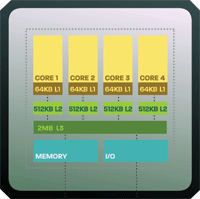AMD Speaks On Barcelona & Phenom
Recently, we had the opportunity to speak with John Freude, AMD's Worldwide Business Development Manager for Server/Workstation Products. That's quite a mouthful, but it means he's the guy who has to make sure the new Quad-Core Opteron (Barcelona) sells well all over the world. Of course, we not only talked about the Barcelona, but also a related desktop processor family - the AMD Phenom. Let's start with the Barcelona.
The Barcelona
First, we asked about the long-promised benchmarks for the Barcelona. Since AMD's simulated results of a 2.6 GHz Barcelona processor was retracted, AMD has remained steadfastly silent about the new, updated benchmarks they promised would be forthcoming since that debacle. Well, when can we expect AMD to start talking numbers again?
 John says the Quad-Core Opteron systems had already been submitted to the benchmark organizations for testing. The results are all under NDA and will only be released on launch date, September 10, 2007. Because they are under NDA, he cannot reveal the actual results, but he gave us some interesting indications of how the Barcelona will eventually fare against an equivalent Intel processor.
John says the Quad-Core Opteron systems had already been submitted to the benchmark organizations for testing. The results are all under NDA and will only be released on launch date, September 10, 2007. Because they are under NDA, he cannot reveal the actual results, but he gave us some interesting indications of how the Barcelona will eventually fare against an equivalent Intel processor.
- 20-30 % better performance overall
- 170 % better performance in some benchmarks
More importantly, he says, the Quad-Core Opteron (Barcelona) will offer 45-50% better performance than current dual-core Opteron processors at the same power consumption and thermal dissipation. Intel quad-core processors, on the other hand, only offer 30-35% better performance (11% in floating point) than their dual-core processors with a 23-50% increase in power consumption and thermal dissipation.
Of course, we need to point out that John was comparing the 65 nm Barcelona against the current dual-core Opteron processor, which is a generation behind in design and fabrication process (90 nm). That would account for the tremendous performance increase while maintaining the same TDP. Intel's quad-core processor, of course, looks much less impressive when compared against a dual-core Intel processor of the same design and manufacturing process (65 nm). So, we don't think you should take that comparison at face value. George Ou of ZDNet has this to say about AMD's claims :
We know that a simulated Barcelona 2.6 barely has a 1% advantage clock-for-clock at eight threads for SPECint_rate2006 and that almost guarantees that an Intel Clovertown 2.0 GHz system will knock down a Barcelona 2.0 GHz system on SPECint_rate2006. That's a little counter intuitive but IPCs (Instructions Per Cycle) numbers aren't linear and AMD scales the CPU clock a lot better than Intel at the moment because of the memory bandwidth advantage.
For example, a Clovertown 8-core 2-socket 2.66 GHz system is only 17.83% faster than 2.0 GHz equivalent even though it's 33% faster on the CPU clock. That means a 2.0 GHz Clovertown is a much stronger competitor than the clock speed intuitively implies which means it will almost certainly beat a Barcelona K10 at 2.0 GHz.
John also touched a little on the Budapest. This is basically a single-processor version of the Barcelona, with no coherent HyperTransport (HTT) channels for processor-to-processor communications. It, therefore, cannot be used in multi-processor systems. On the other hand, this will allow AMD to offer it at higher clock speeds and/or lower prices. We should see this processor released at the end of 2007 or early 2008 at the latest.
Now, what about the Phenom?
The Phenom
John reaffirmed that both the Agena (quad-core) and Kuma (dual-core) processors of the upcoming Phenom family will see the light of day by the end of the year 2007. That should help assuage the frustrations of long-suffering AMD fans and investors who recently had to put up with yet another delay of the Quad-Core Opteron (Barcelona). As you recall, AMD emphatically promised the world that the Barcelona would be out by August, 2007 but eventually delayed that to a September 10 launch.
Although there are reports that ODMs are having trouble sourcing even 2 GHz Barcelona processors, John told us that Phenoms will have no problem delivering the higher clock speeds reported by various sources. For certain, the Phenoms will be capable of running at clock speeds higher than Quad-Core Opteron (Barcelona) processors.
Unlike the multiprocessor-capable Barcelona, the Phenom (Agena & Kuma) processors will not require any coherent HTT channels. This, plus the less stringent requirements of a desktop processor, will allow AMD to easily deliver the higher clock speeds reported here.
Questions & Comments
Please feel free to post your questions or comments here!
| Date | Revision | Revision History |
29-08-2007 |
1.0 |
Initial Release. |
31-08-2007 |
2.0 |
Added comments by George Ou of ZDNet on AMD's claims. |








 Add to Reddit
Add to Reddit
